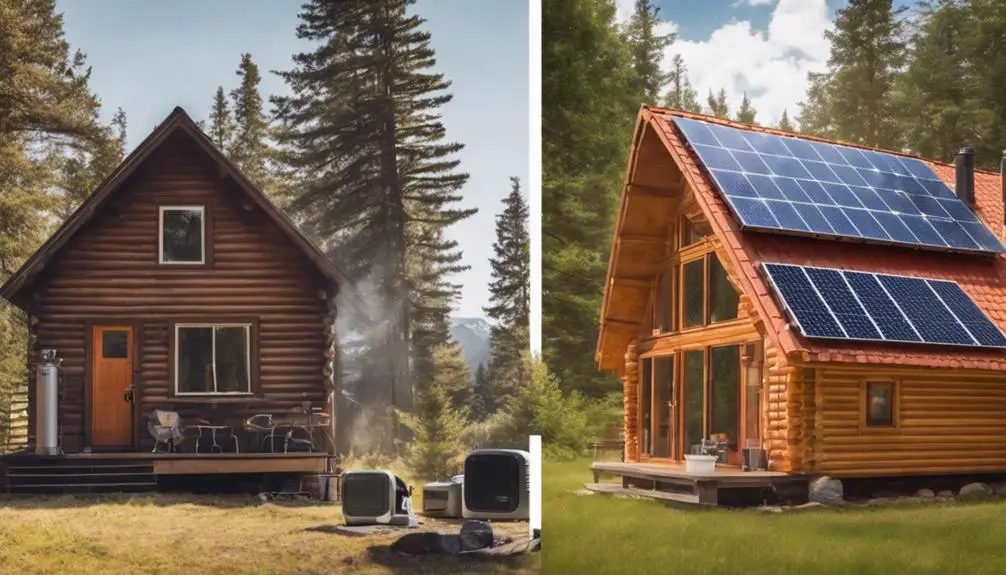When choosing for your cabin, solar panels offer greater long-term savings and energy efficiency. They may have a higher initial cost, but provide consistent power output during daylight hours and require minimal maintenance. With a lifespan of 25-30 years, solar panels reduce reliance on non-renewable energy sources and have a minimal carbon footprint compared to generators. While generators have a lower initial investment, they can be pricier to operate due to fuel costs and lower power efficiency. Evaluating cost, reliability, environmental impact, maintenance, and flexibility will guide your decision on the most suitable power source for your cabin.
Cost Comparison
When comparing the costs of solar panels versus a generator for a cabin, you must consider not only the initial investment but also the long-term operational expenses. Solar panels require a higher initial investment due to the cost of the panels, inverters, and batteries. However, they offer significant long-term savings through reduced or eliminated electricity bills.
Solar panels are energy-efficient, harnessing sunlight to generate power for your cabin, making them a sustainable choice in the long run.
On the other hand, generators have a lower initial investment compared to solar panels but can be more expensive to operate over time due to fuel costs. Generators are commonly used as backup power sources and are reliable during power outages. However, their reliance on fuel makes them less energy-efficient compared to solar panels.
When considering the total cost of ownership, including maintenance and fuel expenses, solar panels often provide greater long-term savings and energy efficiency for cabin owners.
Power Output and Reliability
When considering power efficiency, solar panels have a distinct advantage over generators. Solar panels harness energy from sunlight and convert it into electricity through photovoltaic cells. This renewable energy source provides a consistent power output during daylight hours, making them highly efficient for cabins in sunny regions.
Generators, on the other hand, rely on fuel combustion to generate electricity, resulting in higher operational costs and lower power efficiency compared to solar panels.
In terms of reliability, solar panels offer a more dependable long-term solution for powering a cabin. Once installed, solar panels require minimal maintenance and have a lifespan of 25-30 years. They also have no moving parts, reducing the risk of mechanical failure.
In contrast, generators need regular fuel refills and maintenance to ensure continuous operation. However, generators do have an advantage as backup options during extended periods of low sunlight or in regions with limited sunlight, providing a reliable alternative power source when needed.
Environmental Impact
Solar panels are known for their significantly lower environmental impact compared to generators when powering a cabin. This is primarily due to their sustainable nature and eco-friendly operation. Solar panels have a minimal carbon footprint as they harness energy from the sun, a renewable resource.
In contrast, generators rely on fossil fuels, contributing to greenhouse gas emissions and environmental degradation.
In terms of energy efficiency, solar panels are highly efficient at converting sunlight into electricity, making them a more sustainable option for powering cabins. This efficiency not only reduces the environmental impact but also leads to cost savings in the long run.
Generators, on the other hand, are less energy-efficient and consume non-renewable resources at a higher rate.
Choosing solar panels over generators promotes sustainability and reduces reliance on non-renewable energy sources. By opting for solar power, you're making an environmentally conscious decision that aligns with eco-friendly practices and helps lower your carbon footprint.
Maintenance Requirements
Maintaining solar panels for a cabin typically requires regular cleaning and monitoring to ensure optimal performance and longevity. Establishing a cleaning schedule is crucial to prevent dirt, dust, or debris from accumulating on the panels, which can obstruct sunlight absorption. It's recommended to clean the panels at least twice a year, or more frequently if located in areas with high levels of pollution or pollen.
When cleaning the solar panels, use a soft brush, mild detergent, and water to gently scrub the surface and remove any buildup. Avoid using abrasive materials that could scratch the panels. Additionally, regularly inspecting the panels for any signs of damage, such as cracks or loose connections, is essential for proper maintenance.
In terms of troubleshooting tips, if you notice a decrease in energy production, check for shading from nearby trees or structures that may be obstructing sunlight. Ensure all cables and connections are secure and free of damage. If issues persist, contact a professional solar technician for further assistance.
Flexibility and Portability
Regularly assessing the portability and flexibility of a power source is crucial when comparing solar panels and generators for a cabin. Solar panels offer a high degree of flexibility due to their modular design, allowing for easy expansion by adding more panels to increase energy production. Additionally, solar panels can be mounted on adjustable frames or even portable stands to optimize sun exposure, enhancing their flexibility in various cabin locations. However, solar panels require proper energy storage solutions like batteries to ensure a continuous power supply during low-light conditions or at night.
On the other hand, generators are known for their portability, enabling you to move them easily to different locations within or outside the cabin. This portability comes in handy during emergencies or when power needs vary. Generators, though, require fuel storage and regular refueling, which can limit their flexibility compared to solar panels.
Moreover, generators usually involve a simpler installation process, requiring minimal setup compared to solar panels, making them a convenient option for immediate power needs in a cabin setting.
Conclusion
In conclusion, when considering solar panels versus a generator for your cabin, the most cost-effective and environmentally friendly option is typically solar panels.
For example, John installed solar panels on his cabin in the mountains and was able to power all of his appliances and electronics without relying on a noisy and fuel-dependent generator.
Additionally, the maintenance requirements for solar panels are minimal compared to a generator, making them a more reliable long-term investment.
